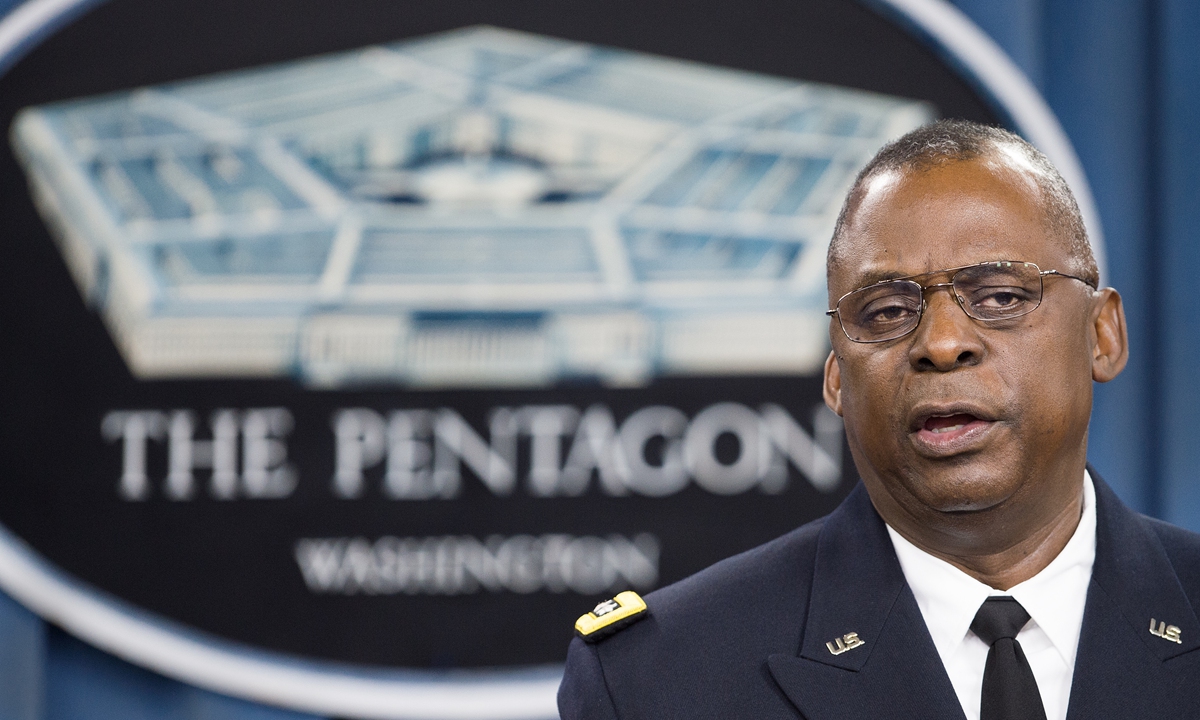Pentagon chief pick may point to reduction of misjudgments
By Wei Dongxu Source: Global Times Published: 2020/12/9 9:48:40

Lloyd Austin Photo: AFP
Writing in The Atlantic Tuesday, US president-elect Joe Biden defended his decision to nominate retired general Lloyd Austin to become secretary of defense. Austin, who in 2013 ran US Central Command responsible for all US military operations in the Middle East, operates in a low-profile manner with pragmatismMichèle Flournoy, former undersecretary of defense for policy, was once viewed as the frontrunner for the position. She famously floated an idea to sink the entire Chinese navy in 72 hours.
Obviously, Biden does not need such a radical person who advocates extreme military policies. Setting aside that her vision runs counter to common sense - there won't be any possibility for the US to realize the goal of sinking Chinese navy in 72 hours from whatever perspective - Biden's administration will need a rational chief helming the Pentagon.
During Donald Trump's presidency, the White House and the Pentagon have often been at odds with each other. As a result, changes at the US Department of Defense resemble a merry-go-round or musical chairs. If the themes on the agenda are always dominated by extreme rhetoric, discord will naturally occur. Biden wants to have a better control of the Pentagon, so he selected Austin, a person with a high prestige within US military. He avoids the limelight, and does not use harsh words. The choice might bridge the gap between the White House and the Pentagon, raising the latter's efficiency to implement Washington's overall military strategy.
Moreover, provoking China will only bring the US more troubles. Picking Austin as the new secretary of defense signals that the US will to some extent ease tensions with China. We might see the US adjust its entire overseas military strategy.
It can be anticipated that Washington will attach more significance in the Middle East. It will not continue to withdraw its troops from the region. On the contrary, the US may send more soldiers there. That's why Biden is choosing Austin: Because he has deep experience in the Middle East.
Biden will likely strengthen its military presence and operations in the region, because the major power games between Washington and Moscow will only become fiercer there. The two countries' geopolitical struggle has gone beyond Europe. Russia has not only built military bases in the Middle East, but is establishing a naval logistics center in Sudan.
Over the years, it has been developing high-tech weapons including nuclear-armed cruise missiles and hypersonic cruise missiles. These pose a huge deterrent toward the US' combat system. The US will without doubt make more efforts to contain and punish Russia in years to come.
Austin has been a member of the Raytheon Technologies board since 2016 when he retired from the army. His connections with arms dealers will also be an advantage for the Pentagon to boost its research and development in innovative weapons, such as developing a new anti-missile system.
In my view, Washington is seeking to extend its Indo-Pacific Strategy toward the Middle East through the Indian Ocean, and toward the deep Pacific Ocean through the South China Sea and Straits of Malacca.
Since the US believes its strategic competitors' military power is getting stronger both at sea and in the air, it wants to enlarge its ring of strategic containment. And the Middle East is an important point of junction in its strategy. This explains why Washington will not carry out strategic contractions in the Middle East. Instead, it will strengthen its presence there.
When it comes to the US' China policy, the Biden administration will continue the strategy of containment with engagement. Austin is a traditional and pragmatic military officer, hence his military policies will be rational. He will likely strengthen military competition with China, staying mainstream with the bipartisan consensus. But military interactions and exchanges between the two countries may return to a normal state. The US actually hopes so. If the two keep isolating each other, the US can hardly gain a comprehensive perception of China's military might.
Austin's pick does not mean Biden is yet signaling a clear military policy toward China. But it can be predicted that the current fierce rhetoric will be reduced, and the channels of contact will be reopened between the two militaries. The US overall strategic pressure toward China will hardly change. Nevertheless, dialogues and interactions will likely increase. This will at least reduce chances of misjudgments and unnecessary risks.
The author is a Beijing-based military analyst. opinion@globaltimes.com.cn
RELATED ARTICLES:
Posted in: VIEWPOINT